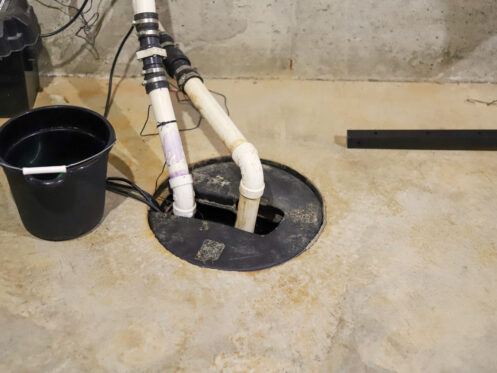Spring rains can bring flooded basements if your sump pump isn’t up for the job. One good downpour can turn a damp corner into a flooded basement, and that’s the kind of mess that can ruin your weekend and your wallet. You don’t want to wait until the water is creeping in to find out your pump isn’t doing its job. A quick check now can save you from stress later and keep your home dry, no matter how hard it rains.
How Spring Rains Put Your Basement at Risk
When spring rolls around, you probably start thinking about pulling out the lawn mower or planting some flowers. What you might not think about right away is your basement. But the truth is all that rain can turn your basement into a wet, smelly mess faster than you’d expect. It doesn’t take a full-blown flood to cause problems. Sometimes, just a few days of steady rain is all it takes for water to find its way in.
The ground around your house soaks up that rain like a sponge. When it gets full, the water needs somewhere to go. If your yard doesn’t drain well or your home is in a lower spot, that water often tries to make its way into your basement. It sneaks through tiny cracks in the walls or seeps in where the floor meets the foundation. You might not notice it right away, but it starts with damp spots or a musty smell. Other times, you’ll walk downstairs and find a puddle where your storage boxes used to be.
That’s where your sump pump is supposed to save the day. When it’s working right, it moves that water out before it can collect. But if it’s not running the way it should or it’s completely dead, then you’re left hoping the rain stops before the water creeps any higher.
Why Sump Pumps Don’t Always Work When You Need Them
A sump pump is sitting quietly in a pit most of the time not doing much of anything. But during a big storm, it’s supposed to kick on and pump water away from your house. However, if it fails to kick on, you’ll find you find out the hard way.
One common reason sump pumps fail is power outages. Big storms often knock out electricity, and if your pump doesn’t have a backup battery, it’s useless when the power’s off. Another problem is clogs. Over time, dirt, gravel, or debris can build up in the pump or the pipe that carries water away. If it gets bad enough, water can’t flow through, and the pump can overheat or burn out.
Sometimes, the problem is as simple as a stuck float. The float is what tells your pump when to turn on. If it gets jammed, the pump won’t know it’s time to start working. Other times, the pump itself is just old. Like any other piece of equipment, sump pumps wear out after years of use. If it’s been more than 10 years since yours was installed, there’s a good chance it’s not as reliable as it once was.
Signs Your Pump Might Be in Trouble
Your sump pump probably doesn’t come with an alarm that lets you know when it’s about to quit. Instead, it gives you little hints if you know what to look for. The most obvious sign is noise. If you hear grinding, rattling, or any kind of loud humming, something’s not right. Pumps should hum quietly when they run, but anything that sounds rough or loud usually means parts inside are wearing down or getting stuck.
Another sign is frequent cycling. If your pump keeps turning on and off, even when it’s not raining much, that’s not normal. It could mean the float switch is stuck or the pit is filling up too fast because water isn’t draining properly. You might also notice your pump running but not moving water. If it’s on but the water level isn’t going down, the discharge pipe could be clogged, or the pump might not have enough power to handle the flow.
Seeing water in your basement, even just a little, is a big warning. It doesn’t always mean the pump is completely broken, but it’s a sign that something isn’t working as well as it should. A good pump should keep your basement dry, even during heavy rain.
Why You Shouldn’t Wait for a Flood to Check It
The last thing you want is to realize your sump pump isn’t working right as water starts flooding into your basement. By that point, you’re not just dealing with a broken pump but you’re trying to save your belongings, mop up the water, and hope the damage isn’t too bad. That’s why it’s better to check your pump before the rain starts falling.
Testing your pump is easy. Pour a bucket of water into the pit and watch what happens. The float should rise, the pump should kick on, and the water should drain quickly. If any part of that process seems slow or off, it’s a sign your pump might need attention.
Even if everything seems fine, having a professional check your system can give you peace of mind. They can spot small issues you might not notice, like minor clogs or worn parts, and fix them before they cause a problem. It’s a lot cheaper and less stressful than cleaning up a flooded basement later.
Benefits of a Backup Pump
If you’ve ever had a power outage during a storm, you know how quickly things can go from bad to worse. Without electricity, your sump pump is just a plastic tub in the ground. That’s why having a backup system can make a big difference.
A battery backup pump kicks in when your main pump loses power. It uses a rechargeable battery and can keep pumping for several hours depending on the model. There are also water-powered backups that don’t need electricity at all. They use your home’s water supply to create suction and pull water out of the pit.
A backup seems like an extra expense, but when you compare it to the cost of replacing carpet, drywall, or furniture after a flood, it starts to look like a good deal. It’s one of those things you hope you never need, but you’ll be glad it’s there if you do.
Sump Pump Professionals
Spring rains can bring out the flowers, but they can also bring flooded basements if your sump pump isn’t up for the job. A small issue like a stuck float or a clogged drain can quickly turn into standing water and damage floors. Making sure your pump is working properly now can save you from an expensive, stressful cleanup later. If you’re ready to check your sump pump or need help with a repair or replacement, call Pure Plumbing in Dallas, TX today. Our plumbing services are second to none!

